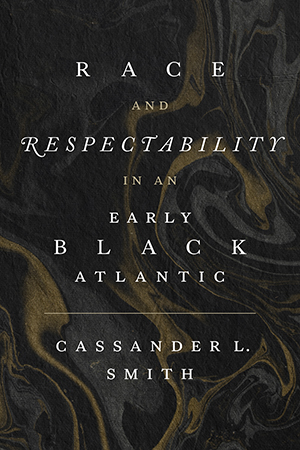
246 pages / 6.00 x 9.00 inches / no illustrations
Literary Criticism / African American | Social Studies / African-American History | Social Science / Black Studies (Global)
Race and Respectability in an Early Black Atlantic examines the means through which people of African descent embodied tenets of respectability as a coping strategy to navigate enslavement and racial oppression in the early Black Atlantic world. The term “respectability politics” refers to the way members of a minoritized population adopt the customs and manners of a dominant culture in order to gain visibility and combat negative stereotypes about their subject group. Today respectability politics can be seen in how those within and outside Black communities police the behavior of Black celebrities, critique protest movements, and celebrate accomplishments by people of African descent who break racial barriers.
To study the origins of the complicated relationship between race and respectability, Cassander L. Smith shows that early American literatures reveal Black communities engaging with issues of respectability from the very beginning of the transatlantic slave trade. Concerns about character and comportment influenced the literary production of Black Atlantic communities, particularly in the long eighteenth century. Uncovering the central importance of respectability as a theme shaping the literary development of cultures throughout the early Black Atlantic, Smith illuminates the mechanics of respectability politics in a range of texts, including poetry, letters, and life writing by Phillis Wheatley, Olaudah Equiano, and expatriates on the west coast of Africa in Sierra Leone.
Through these early Black texts, Race and Respectability in an Early Black Atlantic considers respectability politics as a malleable strategy that has both energized and suppressed Black cultures for centuries.
Cassander L. Smith is associate professor of English and associate dean for academic affairs of the Honors College at the University of Alabama, Tuscaloosa. She is the author of Black Africans in the British Imagination: English Narratives of the Early Atlantic World and the coeditor of several books, including The Earliest African American Literatures: A Critical Reader.
“This is the book that students and teachers have been waiting for, a book that will enable lay readers and experts alike to draw a clearer and more nuanced throughline from the arrival of enslaved Africans in 1619 to the state-sanctioned killings of Black Americans in the twentieth and twenty-first centuries.”—Zachary McLeod Hutchins, author of Before Equiano: A Prehistory of the North American Slave Narrative
Found an Error? Tell us about it.